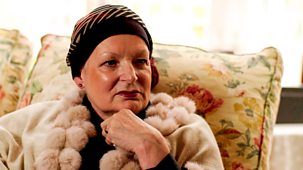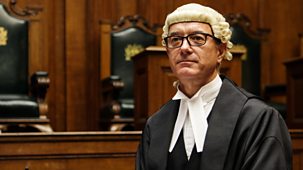
Series 1: Episode 3
In April 1955 Ruth Ellis shot her lover David Blakely dead. It's a case that shocked the nation and it still fascinates today. It has its place in ushering in the defence of diminished responsibility and the eventual abolishment of capital punishment. We all think we know the story, but why, when it was seemingly such an open and shut case, does it still divide opinion on whether Ruth Ellis got the justice she deserved? \n\nFilm-maker Gillian Pachter wants to find out. The result is a fresh investigation with fascinating true-crime twists and turns that also shines a unique light on attitudes to class, gender and sex in 1950s London.\n\nIn episode three Gillian turns her attention to Ruth's execution and the last-minute attempts to save her life even though Ruth herself was determined to die. Despite this Ruth decides to change her solicitor and Gillian is intrigued as to the reasons why. When Ruth does finally admit that someone else was involved in the murder, her new solicitor races to the Home Office in a bid to stop the execution.\n\nHe isn't alone in not wanting to see Ruth hanged. Gillian looks at the hundreds of letters that were sent by the British public to the government asking for Ruth to be reprieved. It's a fascinating snapshot of British attitudes in the 1950s; the letters point to Ruth's mental state, the domestic violence she'd suffered and even the trauma experienced by those who'd lived through the Blitz.\n\nThe police are sent to track down Ruth's other lover Desmond Cussen, who Ruth now claims gave her the gun and drove her to the scene of the murder. But they can't find him and won't take Ruth's word for it. The Home Office decides to press on with the execution; they worry that if they don't follow through on such a high-profile murder case that this will accelerate the abolition of capital punishment.\n\nRuth is hanged and Gillian explores the role of her case in the introduction of the defence of diminished responsibility in England and its place in the eventual abolition of capital punishment in Britain in 1965. But Ruth's personal legacy is much more tragic as Gillian explores the effects of the events of 1955 on Ruth's family. This takes Gillian to a taped conversation recorded by Ruth's son in the 1980s, where his despair at what happened when he was ten is movingly clear; Andre lost his mother and he lost David who he loved. He took his own life in the 1980s and today his ashes are close to his mother's in a cemetery in Hertfordshire not far from where David Blakely was buried. Three victims of a truly tragic set of circumstances.
Source: BBC 4
Most recent episodes of The Ruth Ellis Files: A Very British Crime Story
The Ruth Ellis Files: A Very British Crime Story
Series 1: Episode 3
In April 1955 Ruth Ellis shot her lover David Blakely dead. It's a case that shocked the nation and it still fascinates today. It has its place in ushering in the defence of dim ...
19-03-2025
BBC 4
The Ruth Ellis Files: A Very British Crime Story
Series 1: Episode 2
In April 1955 Ruth Ellis shot her lover David Blakely dead. It's a case that shocked the nation and it still fascinates today. It has its place in ushering in the defence of dim ...
12-03-2025
BBC 4
The Ruth Ellis Files: A Very British Crime Story
Series 1: Episode 1
In April 1955 Ruth Ellis shot her lover David Blakely dead. It's a case that shocked the nation and it still fascinates today. It has its place in ushering in the defence of dim ...
06-03-2025
BBC 4
Most popular episodes of The Ruth Ellis Files: A Very British Crime Story
The Ruth Ellis Files: A Very British Crime Story
Series 1: Episode 1
In April 1955 Ruth Ellis shot her lover David Blakely dead. It's a case that shocked the nation and it still fascinates today. It has its place in ushering in the defence of dim ...
06-03-2025
BBC 4
The Ruth Ellis Files: A Very British Crime Story
Series 1: Episode 2
In April 1955 Ruth Ellis shot her lover David Blakely dead. It's a case that shocked the nation and it still fascinates today. It has its place in ushering in the defence of dim ...
12-03-2025
BBC 4
The Ruth Ellis Files: A Very British Crime Story
Series 1: Episode 3
In April 1955 Ruth Ellis shot her lover David Blakely dead. It's a case that shocked the nation and it still fascinates today. It has its place in ushering in the defence of dim ...
19-03-2025
BBC 4



